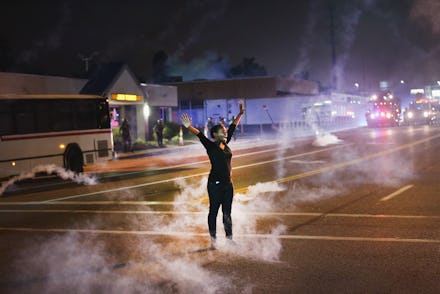Here's What's Missing From Our Conversation About the Ferguson Police Shooting

Democracy doesn't stop and start at your convenience. You either are a democracy or you are not.
You can't say, "America is great because America has freedom," then call for a police crackdown whenever someone disagrees. The right to protest and demand change is not your property. You can't take it away from others when you get scared of its consequences.
Wednesday night, two St. Louis-area police officers were shot during a protest outside the police station in Ferguson, Missouri. Investigators are searching for the perpetrator, but to many, this person's identity is irrelevant. They already know who's at fault: Attorney General Eric Holder, President Barack Obama and every protester who dared take to the streets to criticize the practices of a violently racist police force over the past seven months.
"This is what happens," these people seem to say. "This is what happens when you let anti-police sentiment thrive."
But let's be clear. Police officers are not getting shot because people are protesting; people are protesting because police officers are shooting them. Police officers are getting shot because we live in a country where a staggering number of people get shot, by police or otherwise. It's a tragedy in desperate need of resolution. But this shooting neither discredits the actions of those protesting nor delegitimizes their reasons for doing so in the first place.
We already saw how this story was spun in New York City, when in December 2014 Ismaaiyl Brinsley killed two NYPD officers in Brooklyn. Many blamed the officers' deaths on the critical stance protesters had taken against law enforcement after the killings of Michael Brown and Eric Garner.
"There's blood on many hands tonight," Patrolmen's Benevolent Association president Patrick Lynch said at a press conference after the shooting, according to Gothamist. "We have, for the first time in a number of years, become a 'wartime' police department."
It's remarkable how quickly a story about police accountability became about police officers feeling threatened and besieged by criticism. This shift strained relations between the NYPD, Mayor Bill de Blasio and New Yorkers in the months that followed. Which is impressive, considering holding the police accountable is our job as Americans. It's part of what democracy is.
A key reminder: People in Ferguson continue to protest because, on Aug. 9, Officer Darren Wilson killed unarmed 18-year-old Michael Brown and left his body in the street for four and a half hours. They protest because their police department has been targeting, harassing and using black people as a source of revenue for years. They protest because, in the absence of real political power, protesting is one of the few ways many black Americans have to demand their treatment as equals.
You may find that inconvenient. You may want to push back. You may be inclined to deny that police protect their interests but actively fight against the interests of others. It's okay for you to think this — after all, that's part of democracy, too. But democracy also means your beliefs, opinions and fears don't get to dictate whether that freedom applies to others. Democracy serves us all.
When people are out protesting in the streets, that doesn't mean your interests are being threatened — if anything, it means they're being preserved. That's how democracy works. And the people in the streets insisting on that freedom must not be blamed for a crime they had nothing to do with.